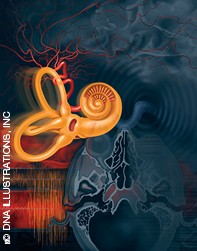Peer Reviewed
Feature Article Ear, nose and throat medicine
Alleviating the distress of tinnitus: a phantom sound
Abstract
Tinnitus is a common otological symptom that is best viewed as a phantom sound. In general, the underlying cause of tinnitus is unknown and there is no known cure for the symptom; however, much can be done to alleviate the distress that it can cause.
Key Points
- Tinnitus can be classified as subjective, involving sounds that only the patient can hear, or objective, involving sounds that the patient and others can hear.
- Subjective tinnitus is the most common type, and often an underlying cause cannot be found.
- Objective tinnitus is less common; affected patients need a full otological assessment as a serious underlying cause can often be found requiring specialist referral and treatment.
- Causes of objective tinnitus include an audible arterial bruit originating from a vascular skull base or temporal bone tumour, dural arteriovenous malformation, carotid artery stenosis, and a hyperdynamic circulation experienced in pregnancy, anaemia and thyrotoxicosis and in patients with acute or chronic anxiety.
- In many cases of tinnitus, the natural history is habituation, and repeated sound stimulation of the auditory pathways (either from the tinnitus itself or a masking sound) leads to a decreased sense of perception of the stimulus.
Purchase the PDF version of this article
Already a subscriber? Login here.

